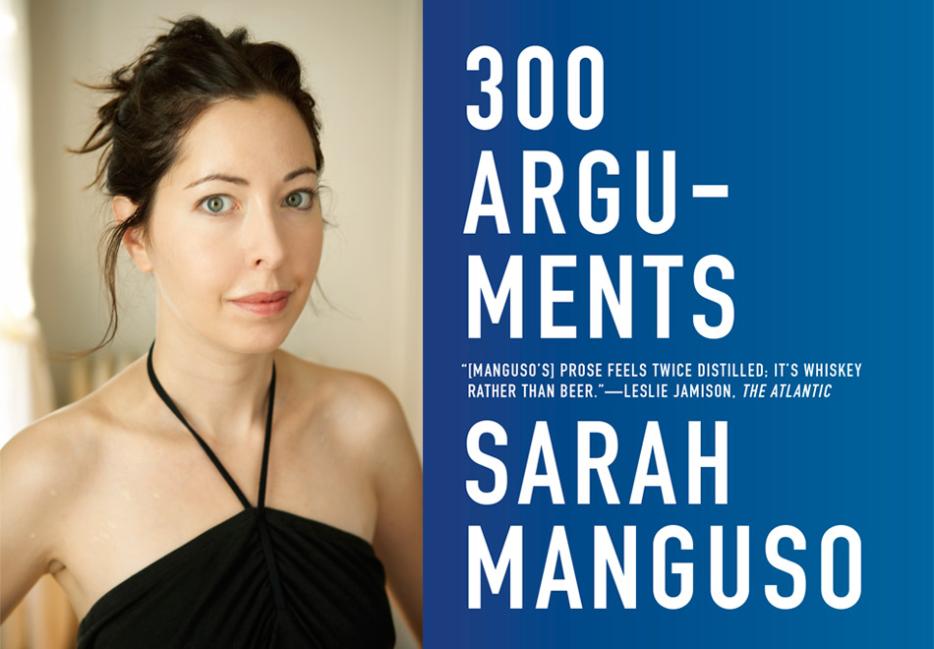In 300 Arguments, Sarah Manguso paints a mostly opaque, but at times penetratingly clear, self-portrait of a female writer at work. In a series of aphorisms, she oscillates between writing in first and third person—expressing her worries and hang ups just as she addresses the reader’s in an all-knowing, prophetic voice. With passages that are at times as short as a tweet, Manguso cuts past any superfluous descriptions or extraneous scene-building details to get to the heart of the matter—whether it be articulating a petty grievance, expressing an adulterous desire, or pinpointing a painfully specific failure.
The narrator’s temper is mercurial; economical sentences range in tone from pithy and sardonic to tender and deeply empathetic. "There will come a time when people decide you've had enough of your grief and they'll try to take it away from you," she writes. But by the flip of a page, this wise and compassionate narrator descends into punchy one-liners that are darkly funny and sharper around the edges. As in: “Inner beauty can fade, too,” and, “Bad art is from no one to no one.”
Anna Furman: 300 Arguments is an unorthodox book both in terms of structure and length. How did the project come about?
Sarah Manguso: This book was a product of procrastination. I was trying to write this other book that I’ve been trying to write for about 15 years. It’s a book about whiteness in Boston and class and hate. I’ve started it many times, in many ways.
While I was pretending to keep working on that big book I started looking away for a moment and writing a couple arguments. Occasionally, I would get one that felt good enough that I knew I had effectively offloaded some kind of worry or thought that I had ruminated on; there was that feeling that I had gotten it right and that I was done. It was actually a really great way to write a book: to just feel like the entire thing was playing hooky on my real book. When I had amassed about 200 of them, I thought: okay, this is substantial enough that it’s a project in its own right. So I decided to shoot for 300, which was a lot harder than writing the first 200.
And why 300?
Yeah, why didn’t I go to 500? There’s something a little grander about 500 than there is about 300. My tendency is to drag my feet when I have to write something to length. And honestly the last 50 or so were so difficult to write that I didn't want the project to turn into something that I wrote out of a sense of obligation. I mean, so many of [the arguments] are written with such pleasure. I didn’t have any of the anxiety that I have when I’m given an assignment. I think I was just trying to find the shortest form that I could convincingly present as a book and then once I had the go-ahead to keep it this short I was able to just really enjoy myself, trying to perfect it.
Some of the aphorisms follow a chronological order while others aren’t necessarily sequential. How did you land on this particular order?
For better or worse, I think of myself as someone for whom chronology comes with difficulty. Narrative is not a mode in which I have great ability; it’s not my natural register.
For a long time I kept the 300 [aphorisms] in alphabetical order, which I realize sounds crazy. It was as arbitrary as any other arrangement but it pleased me in that there was a rubric and it was an objective thing. With great hesitation and significant doubt, I then started grouping them by topic or by theme, and I came up with seven sections — which seemed like a good number, it’s pleasing. The sections were: self, others, desire, art, work, failure, and death. I had them in that order, and it felt right. It felt like: there’s an arc, and it’s the human narrative.
I then grouped them within the sections and it wasn't as terrifying a prospect as putting 300 things in order. It was more like putting 50 things in order by section. I broke it up into small pieces and then smaller pieces and then the transitions between individual arguments became something that I could see more clearly. I had some extremely helpful input from my editor who is thankfully very fluent in narrative. So the answer is really: they were written with relative ease and then put into order with relative difficulty.
While reading this book I kept thinking of visual artists like Jenny Holzer, Tracey Emin, and Barbara Kruger’s work. Are they important references for you?
Oh I’m so glad you hear the Holzer and the Kruger in it. Jenny Holzer was a huge influence on the piece. Her Truisms series, which has been disseminated in many forms, was originally in a show with large-format posters and approximately 100 of these aphoristic one-liners set in alphabetical order in eight posters. One of my college friends had the piece in her dorm room, and I just immediately fell in love with it.
And then, in 2005, on a lark, I thought, wow, can you buy art on eBay? I found it for a couple hundred dollars, got it framed, and now the set hangs around me. They’ve hung in all of the places I’ve lived since then, in their entirety. So Holzer was a conscious influence, but also just having that text surrounding me in the living room, in the dining room—the places where I would work—I’m sure they wormed their way into my brain in a way that I can’t even really know the depths of.
Are there other artists—visual, literary, or otherwise—that have informed your practice?
David Markson’s novel Reader’s Block was very interesting to me because it’s a collection of very tiny compositional units; the way that the tetralogy set coheres is just so vivid and alive. While I was writing The Guardians I read a lot of Yiddish proverbs and I think those have stayed with me too. I found a website and printed out around 800 proverbs.
All this material is just kind of swarming around me at all times. Especially the Holzer. The beauty of the one-liner form is that it’s such a supple form. If it’s the form that interests you, then you can hear it and see it everywhere. I even stooped to include a line in the book that I overheard in a cafe: “Get me one of those cheese sandwiches—Capri? You know, like the island where Tiberius died?” The material is everywhere. There are beautiful, very tiny literary and art forms in just about every medium I can think of.
I was talking to a friend recently about collective anxiety and how the stress of the last two weeks since the inauguration has impacted our sleep cycles. This aphorism stood out to me: “You aren’t the same person after a good night’s sleep as you are after a sleepless night. But which person is you?” Which gets to my next question: how have you been sleeping?
I sleep poorly. I haven’t been a poor sleeper, really, ever before. And it’s funny, when I got the note that you would need to call 45 minutes later, I thought: oh great! I’ll get into bed, I’ll take a nap, I’ll wake up refreshed, everything will be fine. And of course, I come to bed and the gears of my ruminant worry are narrowly turning around and around, and no sleep is happening.
I’m not really sure what to do. I don’t really want to get addicted to tranquilizers again. That’s not really a long term solution to this. I do think that there’s a huge section of the world’s population right now that is on constant alert at all times. And it’s a population of people who probably haven’t had to live that way before. I was around during the Reagan administration, but I was barely conscious because I was a kid. I would pick up on people’s anxiety. But nothing like this. Now I’m an adult, I’m a parent of a young child, and I am aware that he’s picking up on my anxiety.
We have to care for ourselves first, and then care for the civil and human rights of all other people. But we can’t do that if we’re all nervous wrecks.
You wrote: “Depression is hard to describe not just because it’s complex and abstract but also because it occupies the part of us capable of describing things.” On the flip side of this, when are you at your best to describe things vividly and with nuance? Is there a specific time of day or a certain mood that enables you to really plumb the depths?
There’s certainly not a magical time of day that I can rely on being articulate and attentive and open to the kind of associative thinking that is helpful to describe something, especially if it’s abstract. The ability makes itself known to me in a kind of way, and it can happen maybe a couple times a year. Maybe less. It’s something that doesn't feel responsive to my will, and so it fluctuates. It’s anyone guess as to whether that fluctuation follows a pattern or whether it’s just random.
I found this aphorism amusing: “I keep three types of books: those that I want to read, those I want to reread, and those I want to reopen just to confirm how bad they are.” Which books currently fit into those last two categories?
I can’t read Mrs. Dalloway and The Prime of Miss Jean Brodie enough times. I dip into certain poetry collections but that isn't the same thing as reading books from cover to cover.
The books that I want to re-open to confirm how bad they are: honestly, at this very moment I can’t think of one. I know there are a couple in there, but I couldn't possibly name them. That wouldn’t be nice.
I wrote 300 Arguments when I was in a bit of a midlife funk. I was thinking about certain types of failure that just sort of collect at midlife. The idea of midlife is itself a sort of a cliché; it’s a very conventional mode of thinking about the human lifespan. It’s an assumption, to start, that everybody has the same life span. But there really is something to getting to a point in life where major decisions have been made—maybe they’re not permanent but they feel permanent. You choose a vocation and the thing that you do all day long. You choose your people, and if you have a family you’ve chosen the people to include in your family. What felt really sharp to me at the time that I was writing this is that there’s this experience of failure that seems fairly generally applicable to being in one’s midlife. All of a sudden there are these desires that felt obsolete to me that I thought would always feel necessary. There were thwarted ambitions. You sort of realize that failing is a skill of general utility.
Because my work is writing, there are several arguments that address the specific failure of not turning out to be the writer that I thought I would be. Some pieces are embarrassingly petty or personal.
There seems to be a push to make one’s financial situation a little more transparent in the publishing world. In the book Scratch, Roxane Gay shares what her book advances were, and Cheryl Strayed talks about going into debt while on the New York Times bestseller list. You wrote: “Every few years I decide I’ll write something purely for money, and I work on it for a long time. Then I wrap its carcass in plastic and seal it in a container and hide it under the house.” Have you taken non-writing jobs and are you comfortable talking about money?
Well, basically all of my jobs are not writing because my writing is not a commercial enterprise. It never has been. This is not to say I’m proudly, staunchly anti-commercial. It’d be great if I could have a best-selling book and make a little money. I never labored under an illusion that whatever I wrote would wind up magically making money.
So in the beginning, after I graduated college, I was a copyeditor. Then I started teaching a little bit, adjunct-ing, which in itself isn’t really a commercial enterprise either. But once I became a more consistent and experienced teacher, I started teaching more and copyediting a little less. I’ve found that it’s spiritually easier to work on my own writing and have the less regular day job schedule of maybe showing up a couple times a week to teach a class but otherwise I can just sort of loll around my house and do my lesson plans and write my work and not have to really clean up and go to an office somewhere.
I’ve now published a few books and I enjoy the immensely privileged position of occasionally being invited to go and give a talk somewhere and to get paid for that. So current income streams include teaching, probably the biggest part of the pie, and then visiting institutions and giving talks. And then there’s magazine work, which I also do; I write for glossy magazines and semi-glossy magazines occasionally.
And so the book writing, I’ll be honest with you, I got an advance in the mid-four figures for 300 Arguments—a book I worked on for a couple years. So, clearly, this is not a job. Writing these books is not a job. And I guess I'm lucky in that I never assumed it would be so I made other plans.
So many of the arguments are under 140 characters and it seems like such a natural fit that you, as a short form writer, would take to Twitter. I couldn’t find your account and I’m assuming you don’t keep one. Why not?
I’m not on it and I chose not to because I am an obsessive sort and I can correctly assume that if I get on Twitter I will be completely consumed and never clean my house again, and everything would just kind of deteriorate. That’s half kidding, half serious.
The other thing is that I’m not a casual writer. Or I’m not a casual worker. I don’t just toss things off and have them come out in a way that I can tolerate sharing. And I’m not interested in producing writing that’s mostly crappy. Which is not to say that if you’re on Twitter you’re automatically a crappy writer. There are people’s Twitter feeds that I read from time to time, because they are absolutely brilliant at it. Sarah Kendzior, who I’ve been reading for a couple of years, has become one of the leading tweeters of the resistance. Her political commentary on and off Twitter is immensely useful to the world. And I love Megan Amram’s Twitter too.
I’m just not that writer, you know? And in a sense it’s because I have the generally bad quality of turning resistant at the very moment that I’m given an assignment. So if you told me I have to tweet a certain amount of times a day, I will immediately not do that or I’ll immediately think, “Oh can I do like one-tenth as much but spend ten times more hours on writing it?” It’s just not a good road for me to go down, but I’m grateful that other people are good at it. I will also add as an aside that the founder of Twitter was my sixth grade crush, so there remains a kind of nostalgic cloud around the entire enterprise of Twitter.






